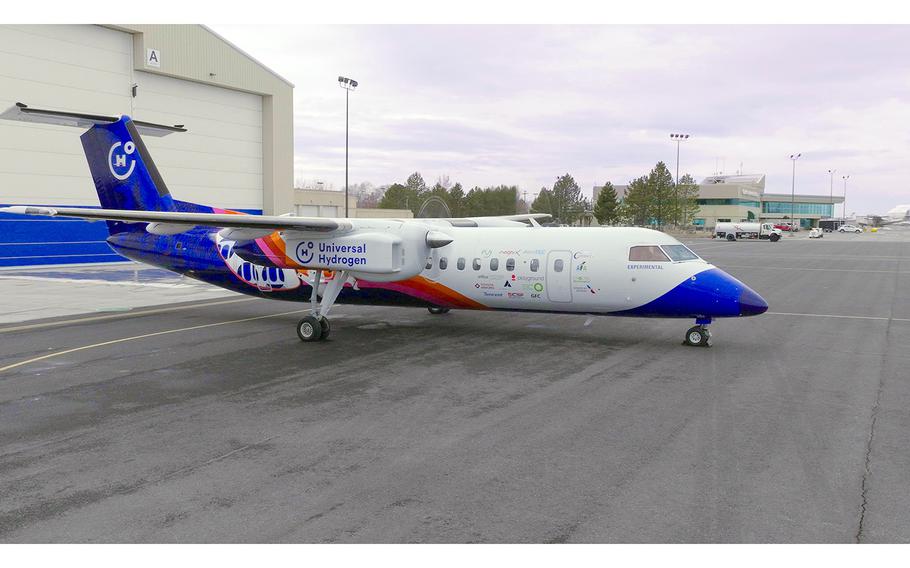
Universal Hydrogen’s Dash 8 testbed aircraft at Moses Lake, when it conducted initial taxi testing on the ground. The FAA on Monday, Feb. 6, 2023, gave clearance for the first flight of the aircraft. (Universal Hydrogen/TNS)
The dream of carbon-free flight is inching toward some reality.
The Federal Aviation Administration on Monday granted California-based Universal Hydrogen clearance to proceed with a first flight of its hydrogen-powered Dash-8-300 test airplane at Moses Lake, Washington.
On Friday, the aircraft began initial ground taxi tests and on Monday the propellers ran up to their full RPM. The FAA's grant of the special airworthiness certificate in the experimental category means that, provided the taxi tests go well, the plane could fly as soon as this month.
Universal, led by Paul Eremenko, former chief technology officer and leading clean energy visionary at both Airbus and United Technologies, is developing the technology to retrofit midsized turboprop aircraft to run on hydrogen.
To create the necessary infrastructure for hydrogen-powered aviation, the company is developing modular pods of liquid hydrogen that can be easily transported to any airport by truck and loaded onto an airplane.
Separately, Universal's engineers are developing a power system inside the plane's nacelle — the casing around the motor — including a fuel cell that converts the hydrogen to electricity that turns the propellers.
Eremenko in an interview Monday compared the hydrogen pod to a Nespresso coffee pod and the airplane to the coffee machine.
On the test plane at Moses Lake, it's only the coffee machine that's being tested: the powertrain that converts the hydrogen to electricity and turns the propellers.
Instead of the pods filled with liquid hydrogen, the plane has a tank of gaseous hydrogen in the back. One propeller is powered by that, the other by regular jet fuel.
If it flies, it will be the largest hydrogen-powered airplane to fly. Universal plans to outfit the Dash-8 with 41 seats.
However, once development is complete, its first product will be the even bigger ATR-72-600, configured for 56 passengers.
Last month, competing California-based ZeroAvia flew a 19-seat Dornier 228 turboprop in England. That plane's hydrogen fuel cell was supplemented by an electric battery to provide extra support for takeoff and backup power.
Universal has developed a powertrain that doesn't require a battery. It's all hydrogen power.
©2023 The Seattle Times.
Visit seattletimes.com.
Distributed by Tribune Content Agency, LLC.